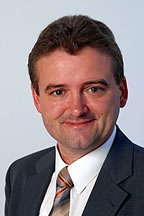
Eindhoven University of Technology (TU/e) has, on 10 February 2011, appointed prof.dr. Volker Hessel as professor of Micro Flow Chemistry and Process Technology in the Department of Chemical Engineering and Chemistry. The appointment of Hessel means the department’s Process Technology cluster now has four researchers to whom prestigious European subsidies worth millions of euro have been granted.
Professor Hessel has since July 2005 been part-time professor of Micro Process Engineering in the Department of Chemical Engineering and Chemistry, within the Chemical Reactor Engineering subdepartment led by prof.dr.ir. Jaap Schouten. The German researcher is currently R&D director for Chemical Milli and Micro Process Technologies at the Institut für Mikrotechnik Mainz (IMM) in Germany. He will start work in his new chair on 1 April as full-time professor in the Department of Chemical Engineering and Chemistry.
Hessel's research into intensifying chemical processes in microreactors will make a flying start through the awarding of an Advanced Grant worth 2.5 million euro by the European Research Council (ERC) in October 2010 for his research proposal entitled Novel Process Windows. With the appointment of Hessel, as well as of four other professors in the Process Technology cluster during the past year (Hans Kuipers, Martin van Sint Annaland, Jan Meuldijk, Maaike Kroon), the Department of Chemical Engineering and Chemistry is underlining its ambition to be among the top European players in research and teaching in the field of process technology.
Three of the six professors in the Process Technology cluster have recently been awarded ERC Advanced Grants: Hessel (2010), Kuipers (2009) and Schouten (2008). One of the department's associate professors (Niels Deen) received an ERC Starting Grant in 2010. "With this group we truly have become a European powerhouse in process technology", says Jaap Schouten.
The establishment of the Process Technology cluster was funded partly by financial support from the 'Sectorplan Natuur- en Scheikunde' (Sector Plan Physics and Chemistry). This funding was made available by the Minister for Education to structurally strengthen the scientific research and teaching in physics and chemistry at the general universities and the universities of technology.
Professor Hessel specializes in intensifying organic reactions with flow chemistry and in microreactors beyond the possibilities of current micro process technology. His new processing paths typically rely on harsh, unusual and unexplored process conditions, which enable new chemical transformations, increase the speed of reactions significantly increased and higher process integration relative to today's chemical production processes. These reactors can therefore be built on a much smaller scale than the classical, large-scale process plants. This results in multifunctional, modular tabletop plants that can be used quickly and flexibly in the chemical laboratory, and that as container-like production plants can easily be transported to the locations at which the end-products are needed, or where the raw materials are available.
Important benefits are reductions in energy and raw material requirements, safer production processes, better and new product quality and shorter time-to-market. In addition, such new processing in microreactors offer extensive opportunities for the development of new reaction routes and new chemicals. The development of new chemical synthesis methods in laboratory microreactors is already in full swing. The same reactor can subsequently serve both laboratory and production purposes, which will allow much faster time-to-market and lower-cost production ramp-up.